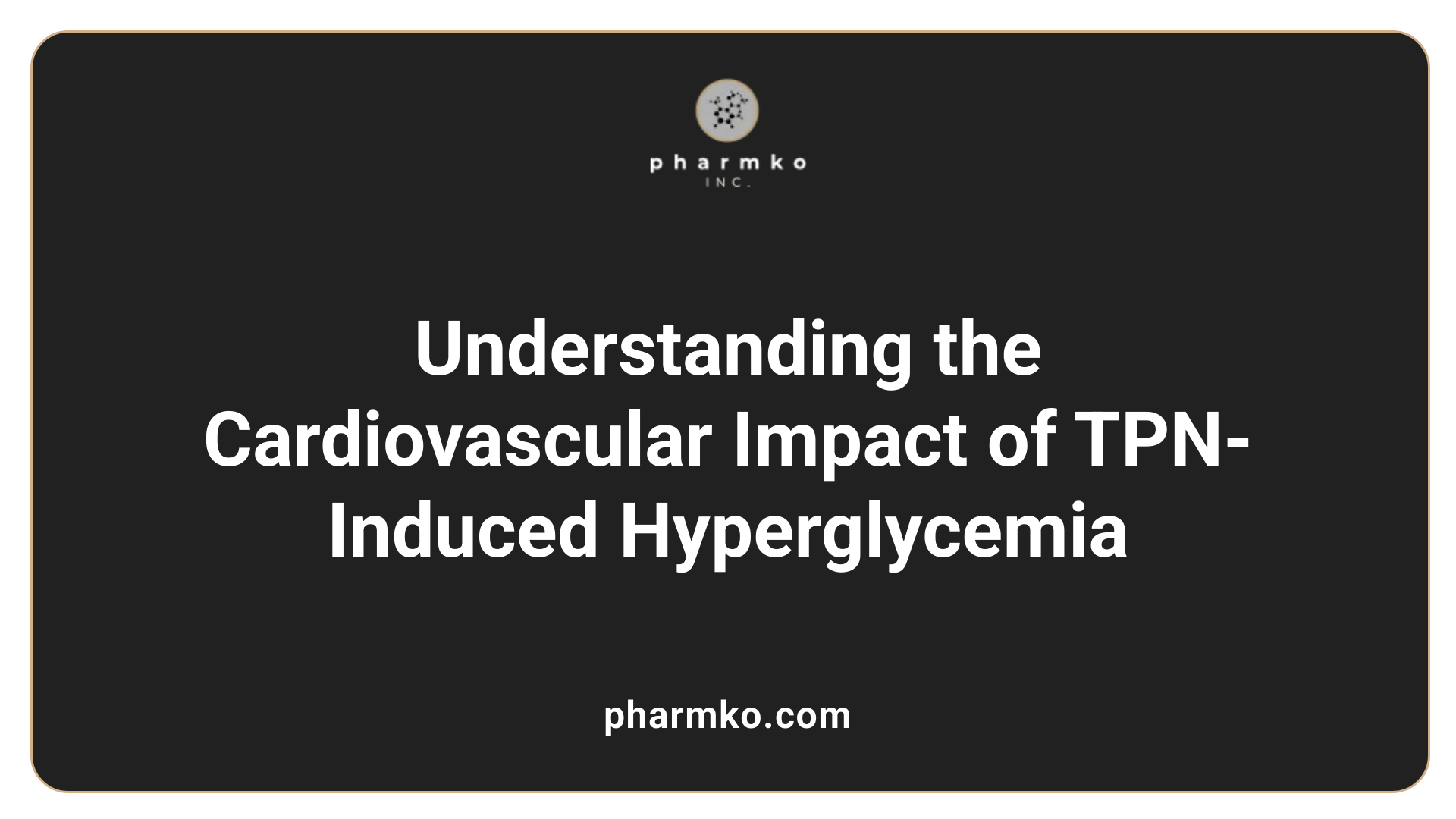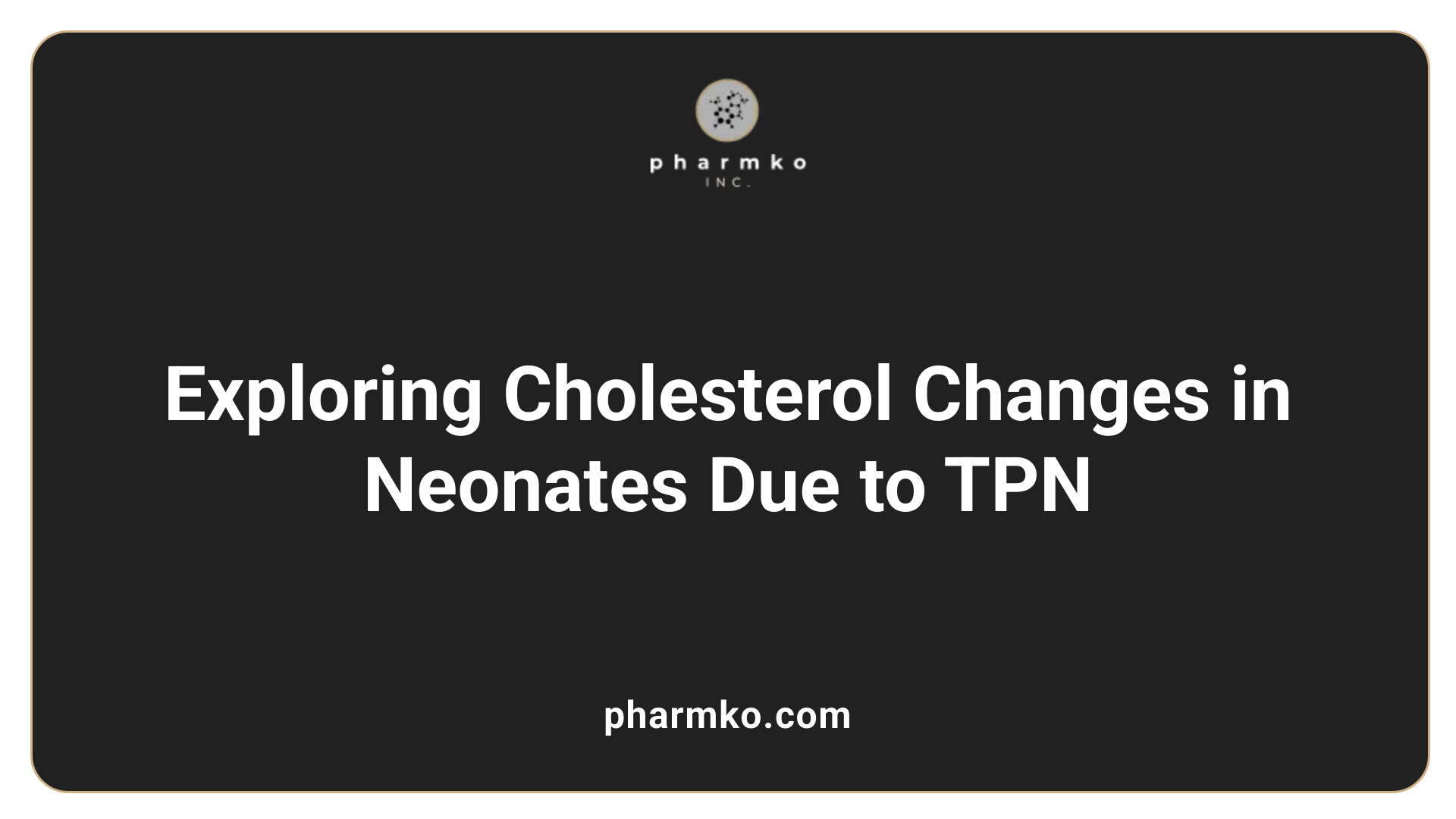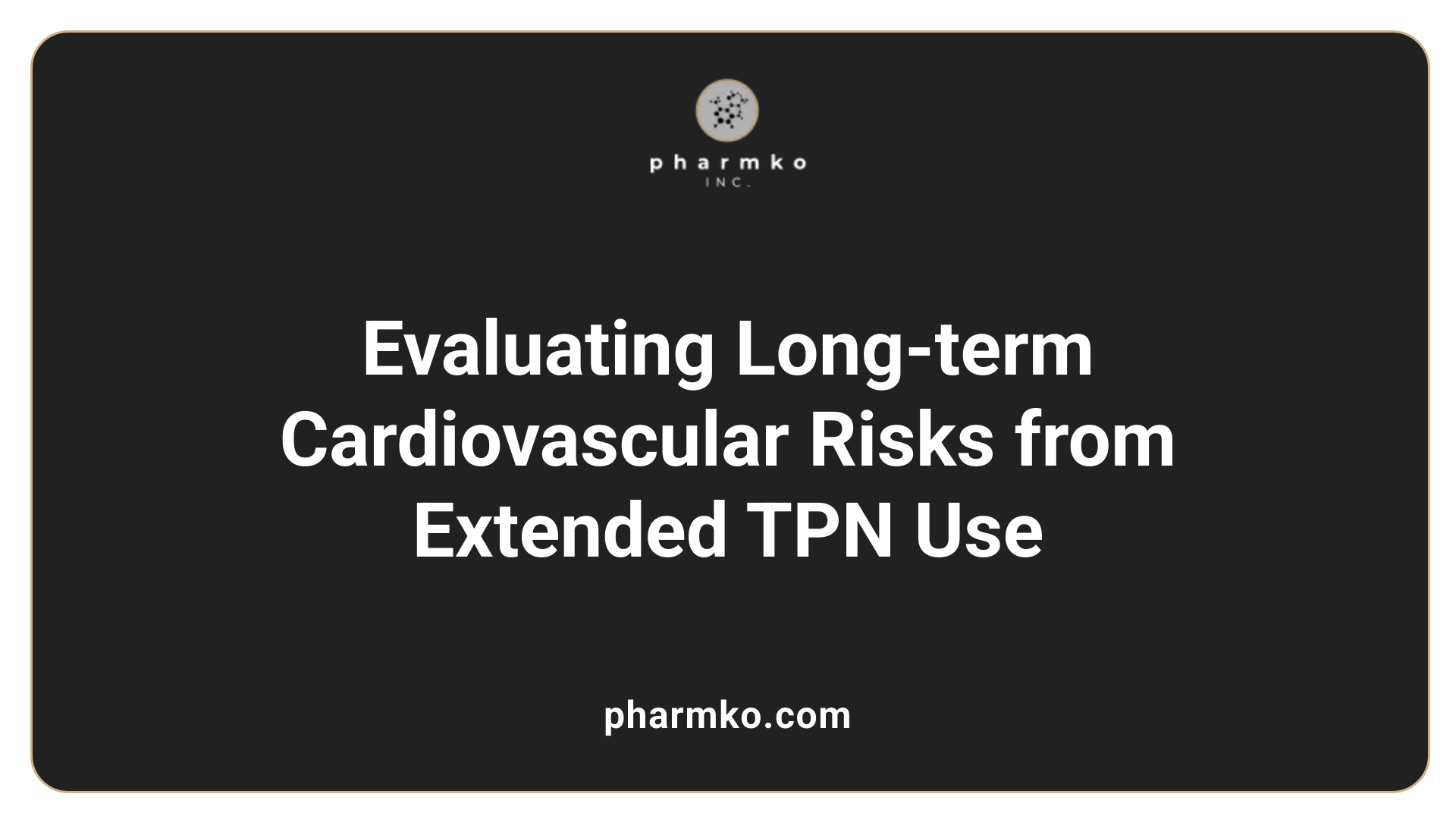The Impact of TPN on the Cardiovascular System
Introduction to TPN and Cardiovascular Impacts
Total Parenteral Nutrition (TPN) is an essential medical treatment for individuals unable to receive adequate nutrition through the gastrointestinal tract. It involves the intravenous delivery of nutrients, providing support to various patient populations, from critically ill individuals to those undergoing major surgeries. However, the impact of TPN on the cardiovascular system is significant and multifaceted, affecting metabolic processes, creating potential risks, and leading to various complications. This article delves into the specific ways TPN influences cardiovascular health, drawing from recent studies and clinical experiences.
Hyperglycemia and Cardiovascular Risks Associated with TPN

How does TPN-induced hyperglycemia contribute to cardiovascular complications?
Total Parenteral Nutrition (TPN) can result in hyperglycemia in approximately 50% of patients, significantly raising their risk of cardiovascular issues. The high glucose concentrations in TPN can exceed the body’s insulin response, leading to increased blood sugar levels. This state of hyperglycemia is linked with an elevated risk of mortality and worsened cardiovascular outcomes, notably a greater than fivefold increase in the risk of serious cardiac events.
High blood glucose levels, especially those exceeding 180 mg/dl, can create a dangerous cycle in patients undergoing TPN. These elevated levels can induce inflammation and oxidative stress within the vascular system, disrupting hemodynamic stability. Moreover, inadequate insulin management during TPN can worsen hyperglycemic episodes, further aggravating the risk of cardiovascular complications. Proper glycemic control is thus vital for improving patient outcomes and minimizing the chance of cardiac difficulties.
What are the statistics on patient outcomes related to TPN and hyperglycemia?
Research indicates alarming trends regarding patient outcomes connected to TPN use and hyperglycemia. In a study involving 1517 nondiabetic elderly patients receiving TPN, those with mean blood glucose levels at or above 11.1 mmol/L encountered cardiac complications at a striking rate of 37.8%. In sharp contrast, only 5.5% of patients with mean blood glucose levels below this threshold experienced similar complications.
Furthermore, multivariate analysis has reinforced these findings, revealing a clear correlation between elevated blood glucose and increased cardiac complications. TPN-induced hyperglycemia not only affects patients' immediate cardiovascular health but also underscores the importance of vigilant blood sugar monitoring and management during TPN therapy.
Impact of TPN on Neonatal Cholesterol and Long-term Cardiovascular Health

Does TPN impact cholesterol levels in neonates?
Total parenteral nutrition (TPN) can significantly impact cholesterol levels in neonates. Studies have demonstrated that infants receiving TPN show higher cholesterol levels compared to those not on TPN. For example, infants on TPN exhibit maximum cholesterol changes from baseline of 103%, whereas those not receiving TPN show only a maximum change of 34%.
This effect is particularly pronounced in premature infants and those with lower birth weights, leading to a greater cholesterol response. The increased cholesterol levels add to a range of metabolic disturbances associated with TPN, which also includes risks like TPN-induced liver injury. Poorly managed cholesterol levels could result in serious complications, including intrahepatic cholestasis, where bile flow is affected.
Long-term cardiovascular effects
Persistent dyslipidemia and altered cholesterol during early life may pose long-term cardiovascular risks. High cholesterol levels established during infancy can lead to premature cardiovascular diseases in later stages of life. Moreover, these elevated risk factors can interact with other health conditions, compounding cardiovascular consequences over time.
Implications of early life nutrition
The nutrition received in the early stages of development is crucial. TPN is often a necessary life-saving intervention for infants unable to receive enteral nutrition. However, this form of nutrition must be managed carefully to mitigate potential adverse effects on long-term health. Using alternatives like fish oil in lipid emulsions instead of standard soybean oil may help reduce some harmful outcomes associated with TPN, including its impact on cholesterol levels.
Challenges in Cardiovascular Health During TPN Use

How does Total Parenteral Nutrition (TPN) affect the cardiovascular system?
Total Parenteral Nutrition (TPN) can have significant effects on the cardiovascular system, primarily through its influence on metabolic parameters. One concern is hyperglycemia, commonly seen in patients receiving TPN, which increases the risk of cardiovascular complications. Up to 50% of individuals on TPN may experience hyperglycemia, and this has been linked to increased cardiac events.
Additionally, TPN can lead to electrolyte imbalances, particularly in sodium, potassium, and magnesium levels, which are crucial for maintaining proper cardiac function. These imbalances may contribute to arrhythmias or increased risk of thrombosis, as proper electrolyte levels are vital for blood clotting and heart rhythm.
What are the metabolic effects of TPN regarding cardiovascular health?
The reliance on TPN can result in long-term metabolic disturbances, including insulin resistance and lipid abnormalities. Elevated triglycerides affect up to 50% of TPN patients, increasing the risk of pancreatitis and impacting cardiovascular health. Moreover, metabolic bone diseases, such as osteoporosis, can develop from long-term TPN, which, while not directly affecting the cardiovascular system, illustrates broader systemic impacts that may include reduced physical activity and consequent cardiovascular instability.
In summary, managing patients on TPN requires close monitoring for these metabolic changes and proactive measures to mitigate cardiovascular risks. A proactive approach includes considering modified TPN formulations that can reduce the incidence of these complications and provide better metabolic control.
Long-term Consequences of TPN on Cardiovascular Health

What are the implications of nutrition management in intensive care settings for cardiovascular outcomes?
Proper nutrition management in intensive care settings is pivotal for optimizing cardiovascular outcomes. Critically ill patients frequently face malnutrition, which can profoundly impact their recovery. Early enteral nutrition (EEN) is typically preferred because it minimizes complications, such as infections, while potentially shortening ICU and hospital stays.
Individualized nutritional support tailored to patients’ specific metabolic needs can significantly reduce all-cause mortality and lower the risk of serious cardiovascular events. This includes ensuring high protein delivery aligned with individual conditions, which can facilitate recovery and improve overall cardiovascular health.
Standardized guidelines for nutrition management in the ICU are essential. They aim to enhance patient outcomes by addressing the unique nutritional requirements of critically ill patients, ultimately leading to better recovery trajectories.
What are the enduring effects on the cardiovascular system?
Total Parenteral Nutrition (TPN) can lead to several serious cardiovascular concerns, particularly with prolonged use. Chronic complications from TPN, such as hepatic dysfunction, hyperglycemia, and refeeding syndrome, can stress cardiovascular health by causing electrolyte imbalances that affect cardiac contractility.
For instance, the occurrence of hyperglycemia in TPN patients can elevate the risk of cardiac complications, with studies showing a significant correlation between high blood glucose levels and adverse cardiac events. Additionally, refeeding syndrome can lead to abrupt shifts in serum electrolytes, posing further risks to patients' cardiovascular systems.
What are the study findings on TPN duration impacts?
Research consistently highlights the negative implications of TPN duration on patient outcomes. A study observing 2,812 pediatric heart transplant patients revealed a stark contrast in one-year survival rates: those on post-operative TPN had significantly worse outcomes compared to the no TPN group.
Moreover, infants dependent on TPN during heart transplants showed a hazard ratio of 1.53 for increased one-year mortality. These findings underscore the need for careful consideration of TPN use, especially regarding its length, due to the increased risk of adverse cardiovascular outcomes.
Ultimately, while TPN is critical for meeting nutritional needs, its management requires vigilance to mitigate potential long-term cardiovascular complications.
Navigating Risks and Complications of TPN in Vulnerable Populations

What are the risks and complications of TPN in cardiovascular patients?
Total Parenteral Nutrition (TPN) presents various challenges, especially in vulnerable populations like pediatric and elderly patients. One major issue is the risk of dehydration and electrolyte imbalances, often stemming from inadequate hydration. Additionally, thrombosis is a concerning complication that can endanger cardiovascular health by creating blood clots.
Hyperglycemia and Infection Concerns
Hyperglycemia and hypoglycemia are prevalent in patients receiving TPN, necessitating stringent monitoring of blood sugar levels. Hyperglycemia alone affects up to 50% of individuals on TPN. This condition not only raises the risk of cardiac complications but also increases susceptibility to infection, mainly due to the necessary venous access required for TPN administration. Such infections can further complicate cardiovascular recovery.
Prolonged TPN Use and Liver Health
Prolonged TPN use can lead to liver failure and significant micronutrient deficiencies, particularly in those who are already critically ill. In pediatric heart transplant patients, the data reveals that dependency on TPN correlates with worse post-transplant survival rates. A study indicated that the post-operative TPN group had a one-year survival rate of 85.5%, substantially lower than the 93.3% in those not on TPN.
Case Studies on Cardiovascular Events
Various case studies highlight the cardiotoxic effects associated with TPN. Patients have shown decreased cardiac output linked with lipid emulsions used during TPN, illustrating the potential for serious cardiac events. Moreover, modified TPN formulations that replace some glucose calories with fat have shown promise in reducing pertinent metabolic complications, including liver dysfunction.
In summary, while TPN can be a lifesaving intervention, careful management and awareness of its risks are crucial for maintaining cardiovascular health in vulnerable patient populations.
Conclusion: Balancing Benefits and Risks of TPN
As TPN remains a crucial intervention for patients unable to meet their nutritional requirements through conventional means, understanding its impact on cardiovascular health is essential. This involves addressing the substantial metabolic challenges and complications, ensuring meticulous monitoring and personalized care plans. With advancements in nutritional formulations and clinical protocols, the goal is to enhance patient outcomes while mitigating potential risks, thus providing a balanced approach in utilizing TPN effectively and safely for various patient populations.
References
- Total Parenteral Nutrition Portends Worse One-Year Survival in ...
- Top 6 Risks of TPN You Need To Know
- Influence of gestational age and birth weight in neonatal cholesterol ...
- Hyperglycemia is associated with cardiac complications in elderly ...
- Parenteral Nutrition and Cardiogenic Shock - SpringerLink
- Total Parenteral Nutrition (TPN) Complications
- Infants Who Require Total Parenteral Nutrition and Paralytics at ...
- Parenteral Nutrition and Cardiotoxicity | Request PDF - ResearchGate
- [PDF] espen guidelines on parenteral nutrition: cardiology and respiratory ...
- [PDF] The Hitchhiker's Guide to Parenteral Nutrition Management for Adult ...













